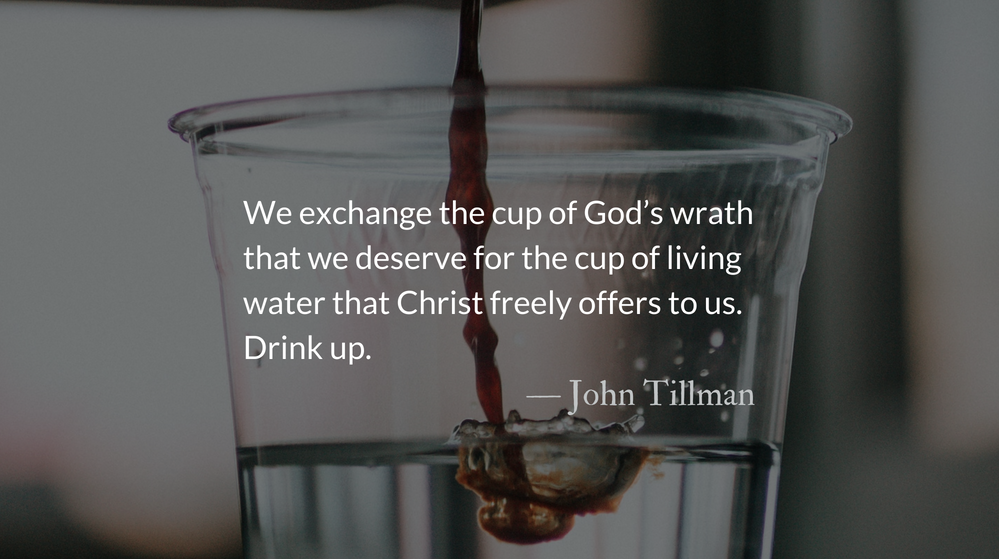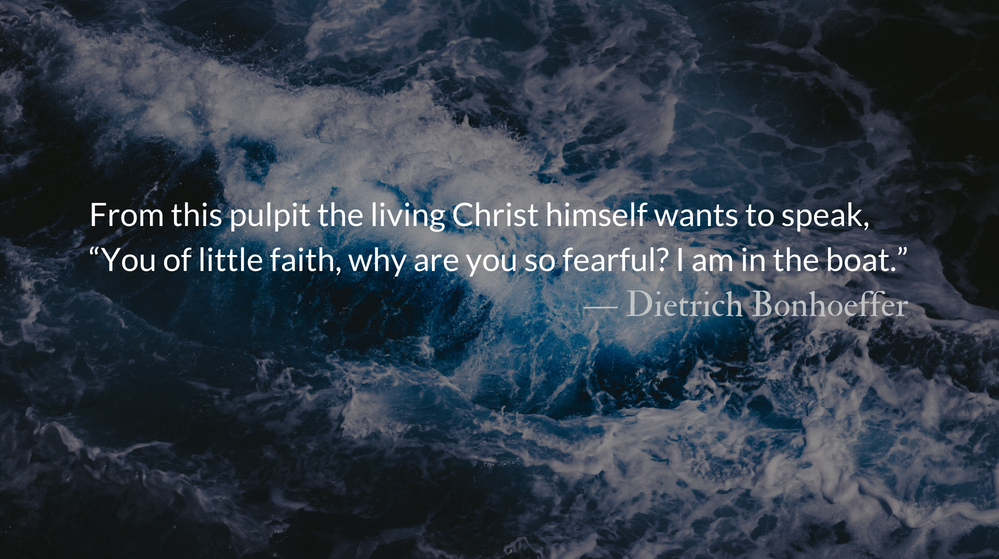Selected by reader, Lauren Nichols from Fort Wayne, IN
The link between multiple biblical images of God’s wrath as something poured out, and God’s salvation as Christ’s blood poured out, hit me very profoundly. It adds yet another layer of eucharist (thanksgiving) to my participation in the Lord’s Supper.
Originally posted on June 19, 2018 with readings from Isaiah 51 and Revelations 21.
See, I have taken out of your hand the cup that made you stagger; from that cup, the goblet of my wrath, you will never drink again. — Isaiah 51.22
…To the thirsty I will give water without cost from the spring of the water of life. — Revelation 21.6
Reflection: Liquid Wrath and Liquid Forgiveness :: Readers’ Choice
By John Tillman
When it comes to divine wrath, scripture often portrays it as a liquid.
Noah’s deadly flood. Jeremiah’s boiling pot. John’s bowls of God’s wrath. The intoxicating cup to be drunk that Job, Isaiah, Jeremiah, and John describe. Even the eternal destination of those under God’s wrath is a lake of fire.
God’s liquid wrath flows from his love for the victims of injustice. It is fueled not by simplistic destructive retribution, but redemptive restoration.
This is what separates the Christian concept of God from that of pagans. A pagan God is always angry, and is only benevolent when placated with bloody destruction.
The Christian God is always loving, and is only wrathful at the abuse of his creation. But our God goes further than that. The God of the Bible does not demand sacrifice from his followers. He provides it on their behalf.
The sacrifices in the Temple were only ever shadows and signs of the true sacrifice to come—the moment when Christ would drink the cup of God’s wrath. And even though it was planned from eternity past, when the moment comes, the cup of God’s wrath is so dreadful that Christ begs not to drink of it.
In the garden, Christ begins to shed his own blood as a sacrifice for us before he has ever been pierced by a spear or nail—before he has ever been struck by a whip or a cruel fist. His blood begins to drip to the ground for us at the simple dread of drinking the cup of wrath before him.
The forgiveness of our sins is accomplished by the sacrifice of Christ’s blood. A liquid sacrifice, flowing from love. The cup of God’s wrath is taken for us by Christ. He begs not to drink it, and yet he does. Leaving us not a drop to taste after him.
It is this sacrifice that makes it possible for Christ to say in Revelation 21, “It is done. I am the Alpha and the Omega, the Beginning and the End. To the thirsty I will give water without cost from the spring of the water of life.”
We exchange the cup of God’s wrath that we deserve for the cup of living water that Christ freely offers to us. That is liquid wrath and liquid forgiveness. That is heaven in two cups. That is the gospel. Drink up.
Prayer: The Request for Presence
Look well whether there be any wickedness in me and lead me in the way that is everlasting. — Psalm 139.23
– Prayer from The Divine Hours: Prayers for Springtime by Phyllis Tickle.
Prayers from The Divine Hours available online and in print.
Today’s Readings
Jeremiah 38 (Listen – 5:18)
Psalm 11-12 (Listen – 1:59)
This Weekend’s Readings
Jeremiah 39 (Listen – 3:11) Psalm 13-14 (Listen – 1:43)
Jeremiah 40 (Listen – 3:50) Psalm 15-16 (Listen – 2:03)
Additional Reading
Read More about The Loving Wrath of God
God is not, by unleashing his wrath on sin, contradicting his love for humankind, but fulfilling it.
Read More about Degrading Each Other
“You have done it unto me.”
Whether we help or harm others, Jesus steps into the interaction.
Readers’ Choice
We have just a few spots left for your suggestions of your favorite posts of the year. Submit a Readers Choice post. Tell us about a post and what it meant to you.
Support our Work
Over 4,000 people every week read an email devotional from The Park Forum. Support our work with a monthly or a one time donation.











